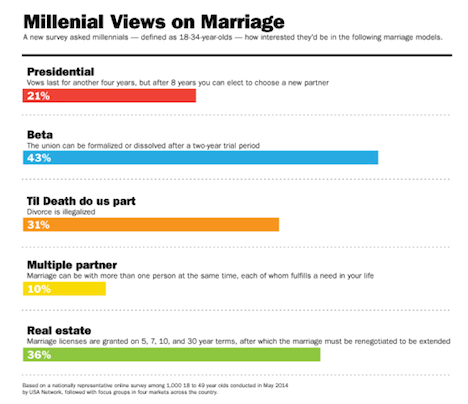The past week has brought into our lexicon the idea of a beta marriage — a limited term marital contract — thanks to an article in Time magazine by Jessica Bennett, “The Beta Marriage: How Millennials Approach ‘I Do,‘ based on a (clearly unscientific) survey conducted by the USA Network in conjunction with Satisfaction, its new TV series. The beta marriage idea caused a kerfuffle at Jezebel, Salon, Fox News and a gazillion other media outlets, some of which began wringing their hands over the idea that young people may not be committed to go the distance. 
Whoa, slow down! It’s not about a lack of commitment; because young adults are wisely postponing marriage, they have more opportunities to have several committed relationships before they tie the knot. In fact, they’re getting better at commitment because they are approaching it consciously. As one Millennial tells Bennett:
“Millennials aren’t scared of commitment — we’re just trying to do commitment more wisely. We rigorously craft our social media and online dating profiles to maximize our chances of getting a first date, and ‘beta testing’ is just an extension of us trying to strategize for future romantic success.”
I love the term beta marriage and wished we had used it in The New I Do: Reshaping Marriage for Skeptics, Realists and Rebels — a reminder that, yes, I am too old to have beta be the first thing that comes to mind when I think of what’s new and uncharted — instead of using the name that caused a similar kerfuffle a decade or so ago, a starter marriage.
In truth, as Bennett points out, the idea of a short-term contractual marriage is not new; anthropologist Margaret Mead was talking about such an arrangement back in the 1970s. But as our research for The New I Do uncovered, the idea of a short, childfree (that part is essential) marriage goes, way, way back (you may be surprised to learn how far back).
So much for Millennials creating a new marital model!
Nevertheless, I was encouraged to read that young adults are looking at our current “traditional” model that bases a successful marriage solely on longevity and sexual fidelity, and deciding, nah, that just isn’t working. That is exactly what we hope people get from The New I Do — an awareness of whether the marital model we know still works for who we are today.
OK, if beta/starter marriages have been around for so long, why aren’t we embracing them? Why aren’t they the norm? Well, more people are having beta marriages although it’s still a pretty small amount — just 17 percent divorce before their fifth wedding anniversary — but there’s still a lot of shame, judgment and sense of failure around short marriages (and divorce in general) and, let’s face it, it’s hard to embrace something that a huge portion of society pooh-poohs.
But Millennials may change that — they may be the first generation to remove the stigma around short marriages, just like they may change expectations about monogamy since the same survey reveals many Gen Xers and Yers believe it’s “a social expectation but not a biological reality.” Because it isn’t biological — monogamy is a choice.
Yet, short contractual marriages will not necessarily give couples what they want from that marriage; why marry for two or five or eight years if you don’t have particular goals in mind? While The New I Do suggests the idea of limited contractual marriages, we believe couples must agree in advance what their responsibilities in the marriage are and what they want the marriage to accomplish. That way, they can determine when the time to renew the contract or not is upon them whether their marriage was successful. And it’s a way to hold themselves accountable. The goals of a starter marriage are going to be a lot different than the goals of a parenting marriage.
None of this means that people won’t be able to marry for lifelong commitment and sexual fidelity; that choice will likely always be available for those who want it. But what’s exciting is how young people are willing to put marriage and all its trappings under the microscope and decide for themselves what a successful marriage will look like. That is exactly how you create stable, happy marriages. And isn’t that what the conservatives (many of whom are pushing to make divorce harder) say they want?
(polls)

















Beta marriage isn’t going to make for better marriages. It will make for FEWER marriages.
Women for get that they are raised to seek marriage from the day they can first understand anything. Men are not. They are, in fact, deliberately NOT taught about marriage, for few men would willingly put themselves into that trap. They struggled all their lives to create a lifestyle for themselves, and marriage requires that they surrender all of that. That gets replaces with the expectation that they submit to catering to feminine needs and desires for the rest of his life. And, if he decides he wants out, it still costs him everything he worked for prior to marriage.
Beta marriage -which women will never support- would only give a young man the information he needs to know that once it ends, he won’t ever seek such a relationship again.